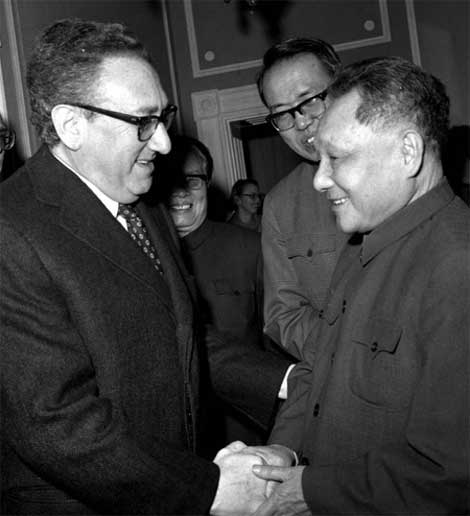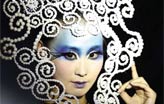Kissinger's latest on china
Updated: 2011-06-24 11:27
By Li Xing (China Daily European Weekly)
 |
|
The late Chinese leader Deng Xiaoping meets Henry Kissinger in Washington during his first visit to the United States in 1979. Xinhua |
Whoever recalls the days leading to Kissinger's Beijing trip invariably cites Nixon's article Asia after Viet Nam, published in the October 1967 issue of Foreign Affairs magazine.
In the 15-page analysis of US Asian policy, Nixon many times cited Peking (Beijing) or Red China or Communist China as a "danger" or "threat" to Asia's future.
However, amid all the anti-China rhetoric, his statement that "taking the long view, we simply cannot afford to leave China forever outside the family of nations ..." drew close attention from Mao and Chinese diplomats.
In China, what veteran diplomat Xiong Xianghui (1919-2005) called the prelude to China's opening up its relations with the US began with Mao assigning four marshals of the Chinese People's Liberation Army to study and discuss current international affairs in late spring 1969.
In his new book, Kissinger recognizes this "prelude".
The marshals were war veterans who had helped found the People's Republic - Chen Yi (1901-1972), Ye Jianying (1897-1986), Nie Rongzhen (1899-1992) and Xu Xiangqian (1901-1990). All had been suspended from their government and military duties for opposing the chaos and faction battles created by the extreme leftists in the first year of the "cultural revolution" (1966-1976).
Entering 1969, Nixon was sworn in as the 37th president of the US, telling the media that American policy toward China would not change unless China changed. While finding it increasingly difficult to continue the Vietnam War, Nixon kept sending more troops into the Southeast Asian country.
Meanwhile, China-Soviet relations worsened. In addition to their deployment as a 1 million-strong force on the border, Soviet troops started skirmishes on China's Zhenbao Island on the border, killing and wounding Chinese soldiers.
According to Xiong, who was Zhou's longtime assistant, the four marshals at first were skeptical about their new assignment. But Zhou explained to them that Mao believed that any subjective analysis (in this case, of world affairs) must agree with objective reality, Xiong recalled in an article first published in a Party history archives magazine in 1992.
As reality changes in the world, subjective understanding and conclusion (of world affairs) must change accordingly, recalled Xiong, who was assigned by Zhou as one of the quartet's two assistants, helping with English language references and note taking.
Between June and September 1969, the four marshals held 16 meetings, totaling 48 hours, producing a series of analyses about the goings-on of the world and the "struggles" among the three major players in the world - China, the Soviet Union and the United States.
The prevailing belief within the Party then was that the US and the USSR were joining hands in dominating the world and that the US shifted its strategic objectives to Asia and to China. But Xiong said the four marshals overturned the belief by concluding that both the US and USSR would play the China card in their fight for dominance in Europe and the Middle East.
Since the Soviet Union posed a bigger threat to China, Chen Yi, vice-premier (1954-1972) as well as foreign minister since 1958, put forward what he considered "unconventional thoughts", that China could play the American card, Xiong said. After all, the US needed China's help as well in getting out of the Vietnam War.
Chen proposed that the two countries go beyond the established channel of ambassadorial meetings in Warsaw to open China-US dialogues between foreign ministers or even higher levels of officials and discuss the fundamental issues barring the normalization of the two countries' relations.
In his narrative, Xiong featured the courage and wisdom of the quartet, who had to wade through all types of political and media pronouncements from the three countries and fight off the danger of political persecution from the ultra-leftists within.
E-paper

Pret-a-design
China is taking bigger strides to become a force in fashion.
Preview of the coming issue
Franchise heating up
Party place
Specials

Premier Wen's European Visit
Premier Wen visits Hungary, Britain and Germany June 24-28.

My China story
Foreign readers are invited to share your China stories.

Mom’s the word
Italian expat struggles with learning English and experiences the joys of motherhood again.
